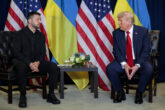October 05, 2022
The Energy Crisis Could Fragment the European Union
In her State of the Union address on Sept. 14, European Commission President Ursula von der Leyen emphasized European Union unity in response to Russia’s war in Ukraine, noting that the “Union as a whole has risen to the occasion.” This statement largely rings true. The EU’s severe sanctions on Russian central bank assets, oligarchs, and its commercial banking sector, along with measures such as military assistance to Ukraine and protection for its refugees, demonstrate an impressive willingness to act together in a crisis. As the war passes the seven-month mark, however, fractures in European solidarity are deepening, driven largely by turmoil in the energy sector.
A bleak winter looms for the European Union. As temperatures drop, demand for natural gas will surge, putting pressure on the bloc’s increasingly constrained supplies in the wake of Russia’s cutoffs of exports through and apparent sabotage of key pipelines such as Nord Stream 1. Already, citizens are struggling to deal with dramatic rises in energy costs — residential consumers in Spain, for example, have paid 140 percent more for natural gas, while German and French electricity prices had increased by more than tenfold over the previous year as of late August.
As European leaders face the daunting task of managing the energy crisis during the winter ahead, it will take adept political compromise to maintain the morale of citizens and their support for Ukraine in its war with Russia.
This energy crunch is causing quarrels among member states. Germany, Spain and Portugal are currently at odds with France over the completion of the MidCat pipeline, which could alleviate Central Europe’s gas supply constraints by linking it with the Iberian Peninsula. French President Emmanuel Macron adamantly opposes the project, arguing that the pipeline is unnecessary and clashes with the bloc’s energy transition goals. However, this opposition likely stems instead from a desire to block competition for French energy exports — an unpromising sign for EU solidarity.
Read the full article from The Hill.
More from CNAS
-
The Return of Diplomacy to Great Power Competition
On the surface, great power competition often seems driven by economic and military conflict, but diplomacy has always been central to great powers' engagement with the world....
By Andrea Kendall-Taylor & Jim Townsend
-
What’s Driving President Trump’s New Confidence in Ukraine’s War Effort
President Trump dramatically declared on social media that he now believes that Ukraine can reclaim all its land from Russia, which he described as a paper tiger. From the Ova...
By Richard Fontaine
-
Moldova Chooses Its Future with William Hill and Laura Thornton
On September 28th, Moldovan voters went to the polls in parliamentary elections to choose between competing visions for their country's future. Despite intense efforts by the ...
By Andrea Kendall-Taylor & Jim Townsend
-
Europe Must Counter Cheap Drones with Cheap Solutions, Ex-NATO Commander Says
NATO must find cheaper ways to counter the growing threat of Russian drone incursions, the former Supreme Allied Commander for Europe, Gen. Philip Breedlove, has said. Speakin...
By General Philip M. Breedlove




